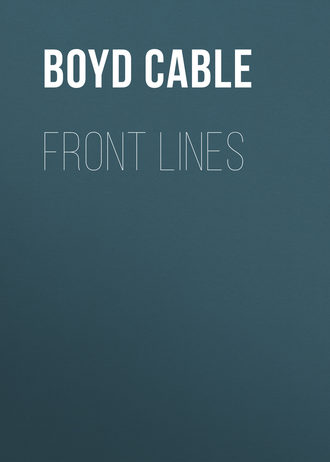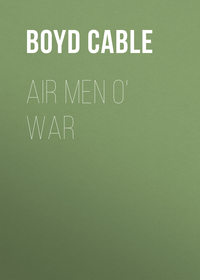 полная версия
полная версияFront Lines
He slept snatchily through the rest of the journey, waking many times as the car bumped badly, and once, when it dropped heavily into a shell-hole and bounced out again, flinging him bodily upwards until his head and shoulder banged solidly against the roof, taking half a minute to regain his scattered wits and dissipate a wild dream that the car had been fairly hit by a shell.
And when at last he reached H.Q., crawled wearily out of the car, and staggered, half asleep and utterly worn out, into his room, he found there the other officer he had left to handle his work and the youthful aide humped over the table copying out reports.
“Hullo,” said the senior, “you’re late. I say, you do look tucked up.”
The Captain grunted. “Not more’n I feel,” he said, blinking at the light. “Thank the Lord my job’s over and everything fixed and ready so far’s this end goes.”
“You’ve heard, I suppose!” said the other. “No? Baddish news. Our left has cracked and the Germ has a slice of their trenches. It upsets all our plans, and we’ve got ’em all to make over again.”
The Captain stared blankly at him. “All to make … that means all to-day’s work to begin and go through again. All to-day’s work – well, I’m …”
The aide had been eyeing the mud-bedaubed figure with water dripping from the torn coat, the sopping cap dangling in the dirty hand, the blue unshaven chin and red-rimmed eyes. He giggled suddenly. “I say, you know what the troops call the Staff?” He spluttered laughter. “The Gilded Staff,” he said, pointing at the Captain. “Behold – oh, my aunt – behold the Gilded Staff.”
X
A RAID
For several days our artillery had been bombarding stretches of the front German trenches and cutting the wire entanglements out in front of them preparatory to a big attack. The point actually selected for the raid was treated exactly the same as a score of other points up and down the line. By day the guns poured a torrent of shrapnel on the barbed wire, tearing it to pieces, uprooting the stakes, cutting wide swathes through it. Because the opposing lines were fairly close together, our shells, in order to burst accurately amongst and close over the wire, had to skim close over our own parapet, and all day long the Forward Officers crouched in the front trench, observing and correcting the fall of their shells that shrieked close over them with an appalling rush of savage sound. And while they busied themselves on the wire, the howitzers and heavier guns methodically pounded the front-line trench, the support and communication trenches, and the ground behind them. At night the tempest might slacken at intervals, but it never actually ceased. The guns, carefully laid on “registered” lines and ranges during the day, continued to shoot with absolute accuracy during the darkness – although perhaps “darkness” is a misleading term where the No Man’s Land glowed with light and flickered with dancing shadows from the stream of flares that tossed constantly into the air, soaring and floating, sinking and falling in balls of vivid light. If no lights were flung up for a period from the German line, our front line fired Verey pistol lights, swept the opposing trench and wire with gusts of shrapnel and a spattering hail of machine-gun bullets to prevent any attempt on the enemy’s part to creep out and repair their shattered defences.
Our bombardment had not been carried out unmolested. The German gunners “crumped” the front and support lines steadily and systematically, searched the ground behind, and sought to silence the destroying guns by careful “counter-battery” work. But all their efforts could not give pause to our artillery, much less silence it, and the bombardment raged on by day and night for miles up and down the line. It was necessary to spread the damage, because only by doing so, only by threatening a score of points, was it possible to mislead the enemy and prevent them calculating where the actual raid was to be made.
The hour chosen for the raid was just about dusk. There was no extra-special preparation immediately before it. The guns continued to pour in their fire, speeding it up a little, perhaps, but no more than they had done a score of times in the past twenty-four hours. The infantry clambered out of their trench and filed out through the narrow openings in their own wire entanglements, with the shells rushing and crashing over them so close that instinctively they crouched low to give them clearance. Out in front, and a hundred yards away, the ground was hidden and indistinct under the pall of smoke that curled and eddied from the bursting shrapnel, only lit by sharp, quick-vanishing glare after glare as the shells burst. In the trench the infantry had just left, a Forward Officer peered out over the parapet, fingered his trench telephone, glanced at the watch on his wrist, spoke an occasional word to his battery checking the flying seconds, and timing the exact moment to “lift.”
Out in front a faint whistle cut across the roar of fire. “They’re off,” said the Forward Officer into his ’phone, and a moment later a distinct change in the note of sound of the overhead shells told that the fire had lifted, that the shells were passing higher above his head, to fall farther back in the enemy trenches and leave clear the stretch into which the infantry would soon be pushing.
For a minute or two there was no change in the sound of battle. The thunder of the guns continued steadily, a burst of rifle or machine-gun fire crackled spasmodically. Over the open No Man’s Land the infantry pressed rapidly as the broken ground would allow, pressed on in silence, crouching and dodging over and amongst the shell-holes and craters. Four German “crumps” roared down and past, bursting with shattering roars behind them. A group of light “Whizz-bang” shells rushed and smashed overhead, and somewhere out on the flank an enemy machine-gun burst into a rapid stutter of fire, and its bullets sang whistling and whipping about the advancing line. Men gulped in their throats or drew long breaths of apprehension that this was the beginning of discovery of their presence in the open, the first of the storm they knew would quickly follow. But there were no more shells for the moment, and the rattle of machine-gun fire diminished and the bullets piped thinner and more distant as the gun muzzle swept round. The infantry hurried on, thankful for every yard made in safety, knowing that every such yard improved their chance of reaching the opposing trench, of the raid being successfully accomplished.
Now they were half-way across, and still they were undiscovered. But of a sudden a rifle spat fire through the curling smoke; a machine-gun whirred, stopped, broke out again in rapid and prolonged fire. From somewhere close behind the German line a rocket soared high and burst in a shower of sparks. There was a pause while the advancing men hurried on, stumbling forward in silence. Another rocket leaped, and before its sparks broke downward the German guns burst into a deluge of fire. They swept not only the open ground and trenches where the raiders were attacking, but far up and down the line. Rocket after rocket whizzed up, and to right and left the guns answered with a fire barrage on the British front trench and open ground.
But at the attacking point the infantry were almost across when the storm burst, and the shells for the most part struck down harmlessly behind them. The men were into the fragments of broken wire, and the shattered parapet loomed up under their hands a minute after the first shell burst. Up to this they had advanced in silence, but now they gave tongue and with wild yells leaped at the low parapet, scrambled over and down into the trench. Behind them a few forms twisted and sprawled on the broken ground, but they were no sooner down than running stretcher-bearers pounced on them, lifted and bore them back to the shelter of their own lines. The men with the stretchers paid no more heed to the pattering shrapnel, the rush and crack of the shells, the hiss and whistle of bullets, than if these things had been merely a summer shower of rain.
In the German trench the raiders worked and fought at desperate speed, but smoothly and on what was clearly a settled and rehearsed plan. There were few Germans to be seen and most of these crouched dazed and helpless, with hands over their heads. They were promptly seized, bundled over the parapet, and told by word or gesture to be off. They waited for no second bidding, but ran with heads stooped and hands above their heads straight to the British line, one or two men doubling after them as guards. Some of the prisoners were struck down by their own guns’ shell-fire, and these were just as promptly grabbed by the stretcher-bearers and hurried in under cover. Where any Germans clung to their weapons and attempted to resist the raiders, they were shot down or rushed with the bayonet. Little parties of British sought the communication ways leading back to the support trenches, forced a way down, hurling grenades over as they advanced, halted at suitable spots, and, pulling down sandbags or anything available to block the way, took their stand and beat back with showers of bombs any appearance of a rush to oust them.
Up and down the selected area of front-line trench the raiders spread rapidly. There were several dug-outs under the parapet, and from some of these grey-coated figures crawled with their hands up on the first summons to surrender. These too were bundled over the parapet. If a shot came from the black mouth of the dug-out in answer to the call to surrender, it was promptly bombed. At either end of the area of front line marked out as the limits of the raid, strong parties made a block and beat off the feeble attacks that were made on them. There was little rifle or bayonet work. Bombs played the principal part, and the trench shook to their rapid re-echoing clashes, flamed and flared to their bursts of fire, while overhead the British shells still rushed and dropped a roaring barrage of fire beyond the raided area.
In five minutes all sign of resistance had been stamped out, except at one of the communication-way entrances and at one end of the blocked front line. At both of these points the counter-attack was growing stronger and more pressing. At the communication trench it was beaten back by sheer weight of bombing, but at the trench end, where heavy shells had smashed in the walls, and so rendered the fighting less confined to a direct attack, the defenders of the point were assailed from the German second line, man after man fell fighting fiercely, and there looked to be a danger of the whole trench being flooded by the counter-attack. The prompt action of a young officer saved the situation. It had been no plan of the raid to touch the support or second trench, but, ignoring this understanding, the officer gathered a handful of men, climbed from the front trench, and dashed across the open to the second one. His party pelted the counter-attackers massing there with as many bombs as they could fling in a few seconds, turned and scrambled back to the front line, and fell into the scuffle raging there in a vigorous butt-and-bayonet onslaught.
But now it was time to go. The object of the raid had been carried out, and it was risking all for nothing to wait a moment longer. The word was passed, and half the men climbed out and ran for their own line. A minute later the remainder followed them, carrying the last of their wounded. An officer and two or three men left last, after touching off the fuses connected up with charges placed in the first instance in their duly selected places.
A moment later, with a muffled report, a broad sheet of fire flamed upward from the trench. Three other explosions followed on the heels of the first, and a shower of earth and stones fell rattling about the ground and on the shrapnel-helmets of the retiring raiders, and the earth shuddered under their feet. The German gunners slackened and ceased their fire, probably waiting to hear from the front what this new development meant, or merely checking instinctively at the sight and sound. For a moment the shells ceased to crash over the open ground, the raiders took advantage of the pause, and with a rush were back and over their own parapet again.
Over their heads the British shells still poured shrieking and crashing without pause as they had done throughout.
In military phraseology the raid had been entirely successful, a score of prisoners being taken, a stretch of trench completely destroyed, and few casualties sustained. The raiders themselves summed it up in words more terse but meaning the same – “a good bag, and cheap at the price.”
XI
A ROARING TRADE
The “O.C. Dump,” a young Second Lieutenant of Artillery, thumped the receiver down disgustedly on the telephone and made a few brief but pungent remarks on railways and all connected therewith.
“What’s the trouble, Vickers?” said a voice at the door, and the Lieutenant wheeled to find the Colonel commanding the Ammunition Column and the dump standing just inside.
“I was just going to look for you, sir,” said Vickers. “They’ve cut our line again – put two or three heavy shells into that bit of an embankment a mile or so from here, and blown it to glory evidently.”
“I don’t suppose the Engineers will take long to repair that,” said the Colonel. “They can slap down the metals and sleepers quick enough if the embankment isn’t smashed.”
“But it is, sir,” said Vickers. “I was just talking to Division, and they say the trains won’t run in to-night, and that supplies will come up by lorry. And we’ve some heavy lots due in to-night,” he concluded despairingly.
“Let’s see,” said the Colonel, and for five minutes listened and scribbled figures while Vickers turned over notes and indents and ‘phone messages and read them out.
“Yes,” said the Colonel reflectively, when they had finished. “It’ll be a pretty heavy job. But you can put it through all right, Vickers,” he went on cheerfully. “It won’t be as bad as that bit you pulled off the first week on the Somme. I’ll leave it to you, but I’ll be round somewhere if you should want me. When will the first of the lorries come along?”
They talked a few minutes longer, and then the Colonel moved to the door. The “office” was a square shanty built of empty ammunition boxes, with a tarpaulin spread over for a roof. It was furnished with a roughly-built deal table, littered with papers held in clips, stuck on files, or piled in heaps, seats made of 18-pounder boxes, a truckle-bed and blankets in one corner, a telephone on a shelf beside the table. Light and ventilation were provided by the leaving-out of odd boxes here and there in the building up of the walls, and by a wide doorway without a door to it. The whole thing was light and airy enough, but, because it was one of the hot spells of summer, it was warm enough inside to be uncomfortable. Everything in the place – table, papers, bed, seats – was gritty to the touch and thick with dust.
The two men stood in the doorway a minute, looking out on the depleted stacks of ammunition boxes piled in a long curving row beside the roadway that ran in off the main road, swung round, and out on to it again. A few men were working amongst the boxes, their coats off and their grey shirt sleeves rolled up, and a stream of traffic ran steadily past on the main road.
“Pretty quiet here now,” said the Colonel. “But, by the sound of it, things are moving brisk enough up there. You’ll get your turn presently, I expect.”
“I expect so, sir,” said the Lieutenant; “especially if the yarn is true that we push ’em again at daybreak to-morrow.”
“Come over and get your tea before the lorries come in, if you’ve time,” said the Colonel, and moved off.
The Lieutenant stood a moment longer listening to the steady roll and vibrating rumble of the guns up in the line, and then, at a sharp birr-r-r from the telephone, turned sharply into the office.
The lorries began to arrive just after sunset, rumbling up the main road and swinging off in batches as there was room for them in the curved crescent of track that ran through the dump and back to the main road. As quickly as they were brought into position the dump working party jerked off the tail-boards and fell to hauling the boxes of shell out and piling them in neat stacks along a low platform which ran by the edge of the dump track. The dump was a distributing centre mainly for field artillery, so that the shells were 18-pounder and 4·5 howitzer, in boxes just comfortably large enough for a man to lift and heave about. As the light failed and the darkness crept down, candle lamps began to appear, flitting about amongst the piled boxes, dodging in and out between the lorries, swinging down the track to guide the drivers and show them the way in one by one. Vickers and the Army Service Corps officer in charge of the M.T. lorries stood on a stack of boxes mid-way round the curve, or moved about amongst the workers directing and hastening the work.
But about an hour after dark there came some hasteners a good deal more urgent and effective than the officers. All afternoon and early evening a number of shells had been coming over and falling somewhere out from the dump, but the faintness of their whistle and sigh, and the dull thump of their burst, told that they were far enough off not to be worth worrying about. But now there came the ominous shriek, rising into a louder but a fuller and deeper note, that told of a shell dropping dangerously near the listeners. As the shriek rose to a bellowing, vibrating roar, the workers amongst the boxes ducked and ran in to crouch beside or under the lorries, or flatten themselves close up against the piles of ammunition. At the last second, when every man was holding his breath, and it seemed that the shell was on the point of falling fairly on top of them, they heard the deafening roar change and diminish ever so slightly, and next instant the shell fell with an earth-shaking crash just beyond the dump and the main road. Some of the splinters sang and hummed overhead, and the workers were just straightening from their crouched positions and turning to remark to one another, when again there came to them the same rising whistle and shriek of an approaching shell. But this time, before they could duck back, the voice of the “O.C. Dump,” magnified grotesquely through a megaphone, bellowed at them, “Gas masks at alert position every man. Sharp now.”
A good many of the men had stripped off gas masks and coats, because the masks swinging and bobbing about them were awkward to work in, and the night was close and heavy enough to call for as little hampering clothing as possible in the job of heaving and hauling heavy boxes about.
A word from Vickers to the A.S.C. officer explained his shout. “If one of those shells splashes down on top of that stack of gas-shells of ours, this won’t be a healthy locality without a mask on.” The men must have understood or remembered the possibility, because, heedless of the roar of the approaching shell, they grabbed hastily for their masks and hitched them close and high on their chests, or ran to where they had hung them with their discarded tunics, and slung them hastily over shoulder, and ready.
The second shell fell short of the dump with another thunderous bang and following shrieks of flying splinters. Close after it came the voice of Vickers through his megaphone shouting at the workers to get a move on, get on with the job. And partly because of his order, and partly, perhaps, because they could see him in the faint light of the lantern he carried standing man-high and exposed on top of the highest stack of boxes, and so absorbed some of that mysterious confidence which passes from the apparent ease of an officer to his men in time of danger, they fell to work again energetically, hauling out and stacking the boxes. Another half-dozen shells fell at regular intervals, and although all were uncomfortably close, none actually touched the dump. One man, an A.S.C. motor-driver, was wounded by a flying splinter, and was half-led, half-carried out from the dump streaming with blood.
“Ain’t you glad, Bill,” said another A.S.C. driver, as the group passed his lorry, “that we’re in this Army Safety Corps?”3
“Not ’arf,” said Bill. “There’s sich a fat lot o’ safety about it. Hark at that… Here she comes again.”
This time the shell found its mark. The crash of its fall was blended with and followed by the rending and splintering of wood, a scream and a yell, and a turmoil of shouting voices. The dump officer bent down and shouted to the A.S.C. officer below him: “In the road … amongst your lorries, I fancy. You’d better go’n look to it. I’ll keep ’em moving here.”
The A.S.C. man went off at the double without a word. He found that the shell had fallen just beside one of the loaded lorries which waited their turn to pull in to the dump, splitting and splintering it to pieces, lifting and hurling it almost clear of the road. Some of the ammunition boxes had been flung off. The officer collected some of his M.T. drivers and a few spare men, emptied the smashed lorry, and picked up the scattered boxes and slung them aboard other lorries; and then, without giving the men time to pause, set them at work heaving and hauling and levering the broken lorry clear of the road, and down a little six-foot sloping bank at the roadside. Another shell came down while they worked, but at their instinctive check the officer sprang to help, shouting at them, and urging them on. “Get to it. Come along. D’you want to be here all night? We have to off-load all this lot before we pull out. I don’t want to wait here having my lorries smashed up, if you do. Come along now – all together.” The men laughed a little amongst themselves, and came “all together,” and laughed again and gave little ironical cheers as the wrecked lorry slid and swayed and rolled lurching over the bank and clear of the road. The officer was running back to the dump when he heard the officer there bellowing for another six lorries to pull in. He climbed to the step of one as it rolled in, dropped off as it halted, and hurried over to the officer in charge.
“Hark at ’em,” said Vickers, as another shell howled over, and burst noisily a hundred yards clear. “They’re laying for us all right this trip. Pray the Lord they don’t lob one into this pile – the gas-shells especially. That would fairly hang up the job; and there are Heaven knows how many batteries waiting to send in their waggons for the stuff now.”
“They got my lorry,” said the A.S.C. man. “Wrecked it and killed the driver.”
“Hard luck,” said Vickers. “Hasn’t blocked the road, I hope?”
“No; spilt the shells all over the place, but didn’t explode any. We cleared the road.”
“Don’t forget,” said Vickers anxiously, “to tell me if there’s any of the load missing. It’ll tie me up in my figures abominably if you deliver any short.” He broke off to shout at the men below, “Get along there. Move out those empty ones. Come along, another six. Pass the word for another six, there.”
The shelling eased off for a couple of hours after that, and by then the last of the lorries had gone, and their place in the road outside and along the dump track had been taken by long lines of ammunition waggons from the batteries and the Divisional Ammunition Column. Every officer or N.C.O. who came in charge of a batch brought in the same imperative orders – to waste no minute, to load up, and to get to the gun line at the earliest possible moment, that action was brisk, and the rounds were wanted urgently. There was no need to report that action was brisk, because the dump was quite near enough to the line for the steady, unbroken roar of gun-fire, to tell its own tale. The sound of the field guns in the advanced positions came beating back in the long, throbbing roll of drum-fire, and closer to the dump, to both sides of it, in front and rear of it, the sharp, ear-splitting reports of the heavies crashed at quick intervals. The dump was the centre of a whirlwind of activity. The ammunition waggons came rumbling and bumping in round the curved track, the drivers steering in their six-horse teams neatly and cleverly, swinging and halting them so that the tail of each waggon was turned partly in to the piled boxes, and the teams edged slanting out across the road. The moment one halted the drivers jumped down from the saddles, the lead driver standing to his horses’ heads, the centre and wheel running to help with the work of wrenching open the ammunition boxes and cramming the shells into the pigeon-hole compartments of the waggons. The instant a waggon was filled the drivers mounted and the team pulled out to make way for another.





